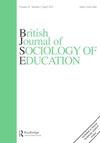The story of women immigrants from FSU and their integration into Israeli academia
IF 2.1
3区 教育学
Q1 EDUCATION & EDUCATIONAL RESEARCH
引用次数: 0
Abstract
AbstractThe under-representation of minorities at senior levels in academia has received some research attention in recent years. However, the experience of immigrant women from the former Soviet Union (FSU) in Israeli academia has not been examined. These women are mostly from a generation known as the ‘1.5 generation’ who immigrated to Israel as children. This study focuses on the intersection of immigration and gender that shape the lives and careers of the 1.5 generation women currently employed as senior academics in Israel. Using the theoretical framework of capital, Bourdieu’s concepts of cultural and social capital, as well as Borjas’ ethnic capital, we analyzed twenty in-depth interviews to examine the perception of these women, their life story, and their professional integration into Israeli academia. We identified two focal points that fostered their success – (1) the Soviet heritage- selective adoption of ethnic capital, encompassing cultural and social capital of an ethnic group and (2) role models within and outside the family often based on ethnicity. We discuss the obstacles faced by minorities in attempting integration into selective professional guilds.Keywords: ethnic capitalminoritiesacademiaimmigration AcknowledgementsWe would like to extend our deepest gratitude to all participants of this study.Disclosure statementNo potential conflict of interest was reported by the author(s).FSU女性移民的故事以及她们融入以色列学术界的故事
摘要近年来,少数民族在学术界高层代表性不足的问题受到了一些研究的关注。然而,前苏联移民妇女在以色列学术界的经历尚未得到审查。这些妇女大多来自被称为“1.5代”的一代,她们在儿童时期移民到以色列。本研究的重点是移民和性别的交叉点,这些交叉点塑造了目前在以色列担任高级学者的1.5代女性的生活和职业。利用资本的理论框架,布迪厄的文化和社会资本概念,以及博尔哈斯的民族资本,我们分析了20个深度访谈,以检查这些妇女的看法,她们的生活故事,以及她们在以色列学术界的专业整合。我们确定了促进他们成功的两个重点:(1)苏联遗产-有选择地采用民族资本,包括一个民族群体的文化和社会资本;(2)家庭内外的角色模型通常基于种族。我们讨论了少数民族在试图融入有选择性的专业行会时所面临的障碍。关键词:民族资本少数民族学术移民致谢我们要向所有参与本次研究的人致以最深切的感谢。披露声明作者未报告潜在的利益冲突。
本文章由计算机程序翻译,如有差异,请以英文原文为准。
求助全文
约1分钟内获得全文
求助全文
来源期刊
CiteScore
3.70
自引率
9.50%
发文量
74
期刊介绍:
British Journal of Sociology of Education is one of the most renowned international scholarly journals in the field. The journal publishes high quality original, theoretically informed analyses of the relationship between education and society, and has an outstanding record of addressing major global debates about the social significance and impact of educational policy, provision, processes and practice in many countries around the world. The journal engages with a diverse range of contemporary and emergent social theories along with a wide range of methodological approaches. Articles investigate the discursive politics of education, social stratification and mobility, the social dimensions of all aspects of pedagogy and the curriculum, and the experiences of all those involved, from the most privileged to the most disadvantaged. The vitality of the journal is sustained by its commitment to offer independent, critical evaluations of the ways in which education interfaces with local, national, regional and global developments, contexts and agendas in all phases of formal and informal education. Contributions are expected to take into account the wide international readership of British Journal of Sociology of Education, and exhibit knowledge of previously published articles in the field. Submissions should be well located within sociological theory, and should not only be rigorous and reflexive methodologically, but also offer original insights to educational problems and or perspectives.

 求助内容:
求助内容: 应助结果提醒方式:
应助结果提醒方式:


